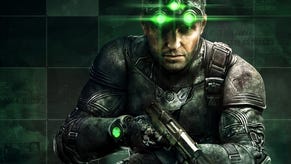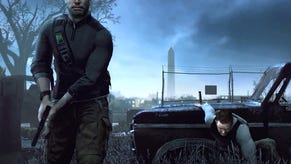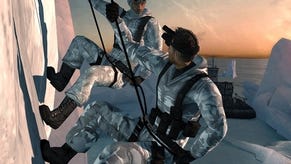Tom Clancy's Splinter Cell: Conviction
Appeal pending.
Looking down from the landing, you discover some men having a discussion in the vast mansion entrance hall under a perilously positioned chandelier, which is quickly delivered onto their heads. This provokes some of their friends to come after Sam, but he's already clinging to a pipe and doing death-from-above drops on them. The relatively open-plan main hall of the mansion, with its grand staircase and surrounding landing, affords the torch-wielding guards decent views, but as you take out individual lights it becomes easy to take them out instead. You move quickly - far quicker than the Sam of old - and they're no match for your contextual repertoire.
You also have other tools to use against them. The B button fires off items from your d-pad-navigated inventory, in which there's an EMP grenade for neutralising light sources and the rather excellent sticky camera - throw one at a wall, and you get a picture-in-picture view of whatever it sees for a limited time, and you can full-screen it at the touch of a button. The guards' AI is based on your last known position, too, and Ubisoft helpfully keeps you abreast of their situational awareness with a ghostly apparition of Sam in his last known position, so you can take further advantage of their likely orientation. With belief firmly suspended, it's easy to file this as the sort of note that Fisher would make to himself, now gift-wrapped for your reference.
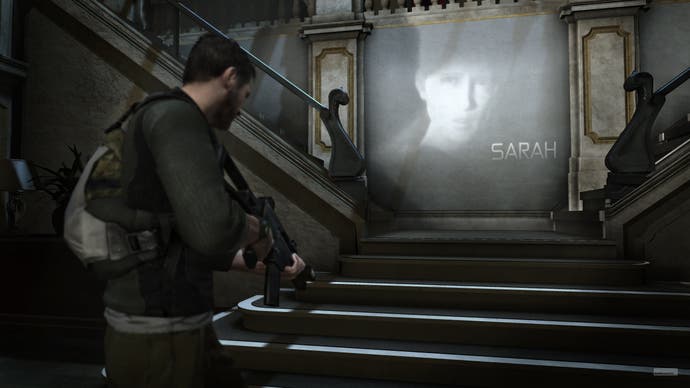
After toying with the guards in the foyer, it's time for the demo finale. Through we go to Kobin's quarters, relieving another enemy of a shotgun along the way. There are bodyguards kicking over tables for cover inside the room, behind thick wooden doors, but as long as you don't hang about you can pull the wing mirror trick again to mark three of them, then take the door and shotgun them before they can react. Rather than barrel through the room, though, it's out the window and along, avoiding a scripted explosion, to flank Kobin at the other end and interrogate him. As you do so, however, Third Echelon agents breach nearby and line you up in their eerie red sights, and Kobin whispers to Sam that if he wants to find out more about his daughter's death, he should go with them. Sam surrenders.
Although Ubisoft is quiet on exactly what happens next, production manager Andréane Meunier says the action switches to Washington for the "majority" of the game thereafter. While it's never an open-world stealth title like Assassin's Creed, individual levels will be vast and non-linear, and Meunier says to expect new gadgets at intervals, but fewer and better than before.
That's a reaction to past criticism, and in many respects Conviction is as a whole - whether it was criticism from without, as at Ubidays, or from within. Sam's new life away from civil service may follow familiar themes, but it's a personal journey designed to breathe life into the character, as he dices with the slick new Third Echelon director Tom Reed (not Kristan Bramwell?), and typically for a Ubisoft Montreal game, Meunier's presentation focuses on how the studio retreated to first principles and re-evaluated the genre before committing to gameplay concepts.
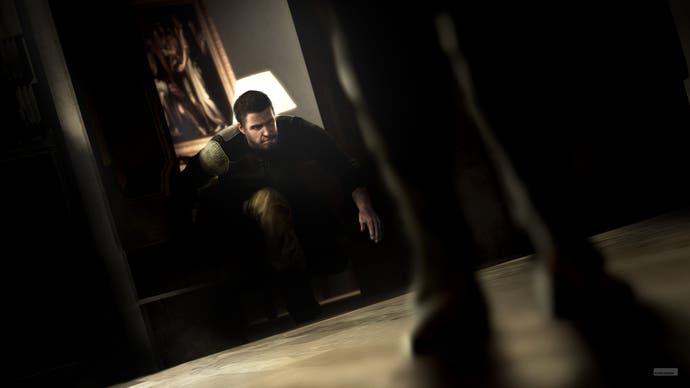
That's been true of games like Assassin's Creed and Prince of Persia, too, but while those were criticised in some quarters for falling into repetitive cycles, Meunier believes Conviction will evade the trap. "If I compare to Assassin's," she says, "you would talk to that person, assassinate that guy, and do that, which are very mechanical ways of doing things. Our gameplay is more philosophical. Analyse the situation, do your thing, and then vanish. Even if I do that 100 times, I think there are 100 ways to do it." Meunier talks about the "prepare, execute and vanish" gameplay loop, but planning alone may involve L-trigger stalking, marking enemies, clambering over pipes for vantage points, distracting guards to reach sub-objectives, or many other approaches. Pace has also been a key consideration - not just in doing away with standing for minutes in the darkness, but in quickly evading enemies once detected. It's much easier to control the situation when it starts going against you.
Sam may be older, then, but Conviction is younger, steeped in the modern Hollywood fascination with super-speed takedowns, brutal hand-to-hand combat and gritty verisimilitude - and for all the game's difficulties since its announcement, it's no surprise to be playing a characteristically adroit first demo from Ubisoft Montreal in 2009. Since I originally wrote this hands-on, Ubisoft has delayed the game in order to ensure that the rest of the game lives up to the E3 snapshot, so my original concluding line still seems apt: As long as it keeps this up across the campaign, Sam Fisher's coming out of the shadows and back into the limelight.
Tom Clancy's Splinter Cell: Conviction is due out for PC and Xbox 360 next year. Check out the Editor's blog for more from Andréane Meunier on the decision to rebuild Conviction in 2007.

